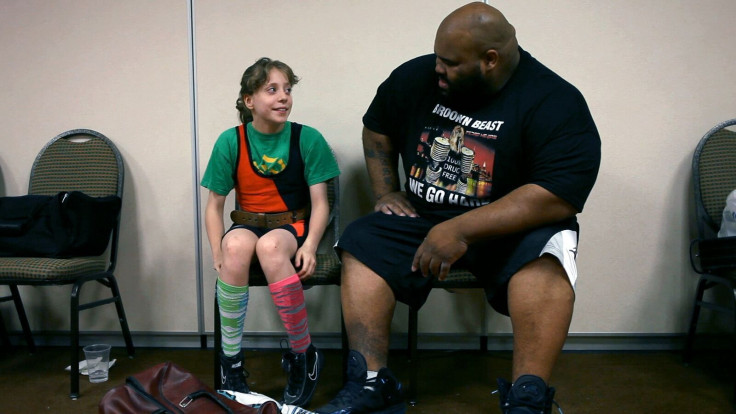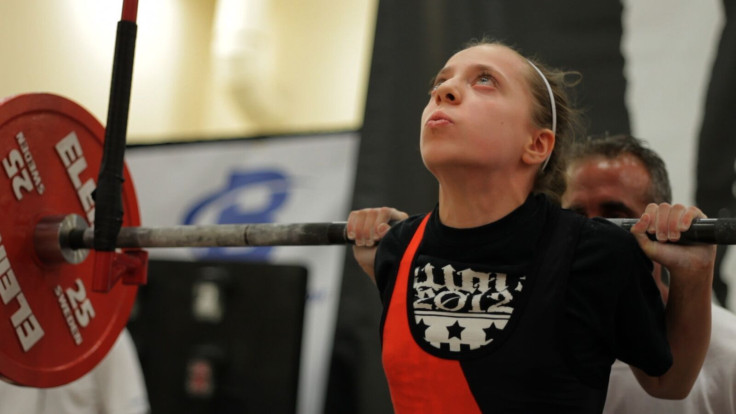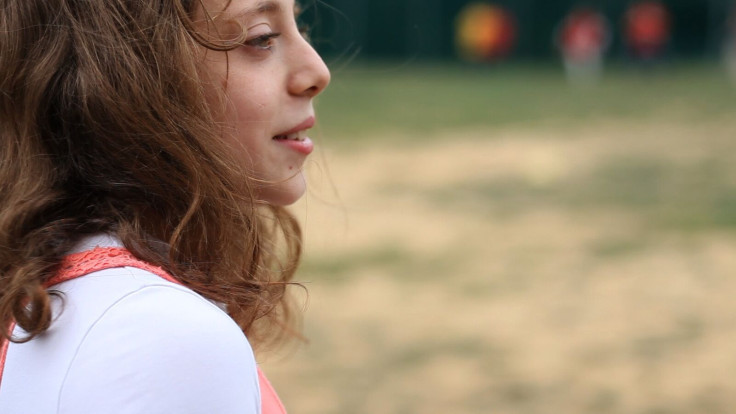'Supergirl': Why Director Jessie Auritt Made A Film About Naomi Kutin, Record Breaking Powerlifter

“Supergirl” is an intriguing coming-of-age film about Naomi Kutin, an Orthodox Jewish girl who broke a world record in the sport of powerlifting. In many ways, Kutin’s story is just like everyone else’s: She’s trying to find her way as she transitions into adolescence. But what makes Kutin extraordinary is her dedication to the sport of powerlifting as she maintains her family's conservative traditions in a faith where her passion isn't always welcome.
Director Jessie Auritt (“The Birdman” 2013) was inspired to make the documentary after she read about Kutin in an article from January 2013. “The piece struck me because not only was it amazing that this young girl was competing in this sport and beating women three or four times her age, but the fact that she was Orthodox Jewish. Women in that faith typically follow traditional gender roles and then here she was participating in this male-dominated sport. It was something I wanted to explore deeper,” she told International Business Times in a phone interview Friday.

When the film starts, Kutin is an 11-year-old girl from New Jersey, who set the all-time women’s record in 2012 after squatting 214 pounds in the under 97 pound category. She took the record away from a 44-year-old woman who previously held the title for nearly a decade.
At that time, Kutin had only participated in powerlifting for two years. Auritt contacted the Kutins in February 2013 and started to film with them that spring. They continued to film for another three years, until Kutin was 14.
The dichotomy of Kutin being a powerlifter and Orthodox Jewish is ever-present. Women in the faith wear modest clothing, which means skirts that go below the knee and shirts that cover their chests and elbows. If the collarbone is showing, that’s too much skin. It’s also forbidden to wear pants. The Kutin family eats kosher and observes the Sabbath, which, in short, means no electronics from Friday night to Saturday night.
Kutin adheres to the modest clothing rules, except when she's “Supergirl.” “The rules of the dress code for competitive powerlifting are pretty much in direct opposition to those of Orthodox Judaism. It's a delicate balance for the Kutin's -- while their religious observance is important to them, they also want Naomi to be able to participate and excel in the sport. In their opinion, it's okay for Naomi to wear a wrestling singlet when she powerlifts because the intent behind it is not to be immodest but to be able to compete in a sport," Auritt explained.
While powerlifting is a major part of Kutin's life, sport isn’t the only thing that matters to her. The film showcases her bat mitzvah, which is when a child becomes an adult in the eyes of God in the Jewish faith.
“When I first found out about Naomi, I knew her bat mitzvah was coming up and it was something I wanted to capture,” Auritt said. “I wanted to emphasize the transition of growing up, evolving and what that means to her in the Jewish tradition.”
Part of Kutin’s journey is figuring out whether she wans to powerlift because it pleases her parents or because it makes her happy. “She’s this young girl who started this sport because it was nice to spend time with her dad. As she gets older, she gets to take ownership of the sport,” Auritt said. “She gets to see what powerlifting means to her and claim her own identity.”
Kutin, now 15, continues to lift to this day. As documented on her Instagram page, Kutin can lift 315 pounds up to five times.
Interwoven into the story of “Supergirl” is how a mother and father parent an exceptional athlete. Kutin's father, Ed, coaches her in their New Jersey basement. Kutin first got into the sport at his suggestion when he saw she was beating everyone in her karate class. He also competes in powerlifting competitions.
“There are people who feel there are health risks involved with powerlifting and they wouldn’t want their children to do that. And there are a lot of people, both doctors and people in the powerlifting community, who feel that powerlifting is perfectly safe-- that is doesn’t affect one’s growth. To them, it’s not more dangerous than putting your kid on a football field,” Auritt said. “Naomi’s parents genuinely want what’s best for their daughter. I don’t think they were doing a disservice to her” by letter her powerlift at an early age.
After spending years with the family, Auritt said she became an adopted member. “We joke that we’re like family now because we’ve spent so much time together,” the director said with a laugh. “I spent holidays at their house and slept over. We bonded so much. You get close to people with a film like this, which gives you an intimidate look at a family.”
While “Supergirl” tackles serious issues like parenting, religion and growing up, it’s the nuances of the film that Auritt likes best.
“I’ve seen the film many times and there are some moments that always make me smile,” she said. “It’s usually glances that Naomi gives to her parents-- the little interactions that happen with just a look. I think everyone who was that age could relate to what she’s thinking.”
Getting to see Kutin transition into womanhood reminded Auritt of her own adolescence. “With Naomi, I really appreciated spending time with their family as an adult and getting to see from an outside perspective what it looks like to raise a teenager,” she said. “It brought me back to myself.”
That’s one of the aspects audiences will connect with. “I think everyone can relate to the movie. Even though you’re not powerlifting, you’ve been in situations like that when you’re parents are pushing you and you’re annoyed,” Auritt said. “The film really finds that common thread that a lot of people can relate to-- even though Naomi is unique and doing things that other people can’t do.”
“Supergirl” will premiere at DOC NYC Nov. 13, 2016 at 4:30 p.m. EST.

Follow me on Twitter @mariamzzarella
© Copyright IBTimes 2024. All rights reserved.






















